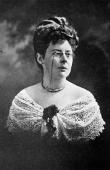Beatrice Grimshaw was the daughter of Nicholas William Grimshaw, merchant, and his wife Eleanor Thomson (nee Newsam). She was educated at Caen in France, the University of London and Queen's College, Belfast. From the age of twenty-one she was a journalist in Dublin before working for various shipping companies in the Canary Islands, the United States of America and England. Her first novel, Broken Away (1897), was a romance about an assertive women rather like herself.
In 1902 Grimshaw became publicity manager in the Liverpool head office of the Cunard Line. In 1903 she left for the Pacific region to report for the Daily Graphic, accepting commissions to write tourist publicity material for Pacific islands and New Zealand. Commissioned by the London Times and the Sydney Morning Herald, she left for Papua New Guinea in 1907 and stayed in Port Moresby for most of the next twenty-seven years. She became unofficial publicist for her friend Hubert Murray, the acting administrator, and in 1908 urged Prime Minister Alfred Deakin to make his temporary position permanent. Deakin commissioned Grimshaw to advertise Papua's need for white settlers and her pamphlets published in 1909 were followed by a book, The New New Guinea. Most of Grimshaw's novels, aimed at the popular market, were written in New Guinea. She wrote forty-two books including a partly autobiographical title, Isles of Adventure (1930). When the Red Gods Call (1911) is the best known: the book has been frequently reprinted, serialised and translated into several languages. There are French, Swedish and Danish translations (unseen) of some of Grimshaw's novels, but it has not been possible to determine the original English titles.
Grimshaw managed a plantation near Samarai during the years 1917 to 1922 and accompanied exploring parties up the Sepik and Fly rivers in 1923 and 1926. In 1933 she tried tobacco growing near Port Moresby with her brother Ramsay. After visiting Fiji, Samoa and Tonga again, Grimshaw retired in 1936 to Kelso, near Bathurst, spending the last seventeen years of her life in Australia. J.F. Was Here (by Nigel Krauth, q.v., 1990) is partly based on Grimshaw's unconventional life. Although she was a best-selling author in the 1920s and sometimes favourably compared with Joseph Conrad, Bret Harte and Robert Louis Stevenson, Grimshaw is now almost unknown and all of her books are out of print. Her work may have had limited literary merit but her Times obituarist acknowledged her 'high competence'.
 1347480197492346757.jpg
1347480197492346757.jpg
 1347480197492346757.jpg
1347480197492346757.jpg